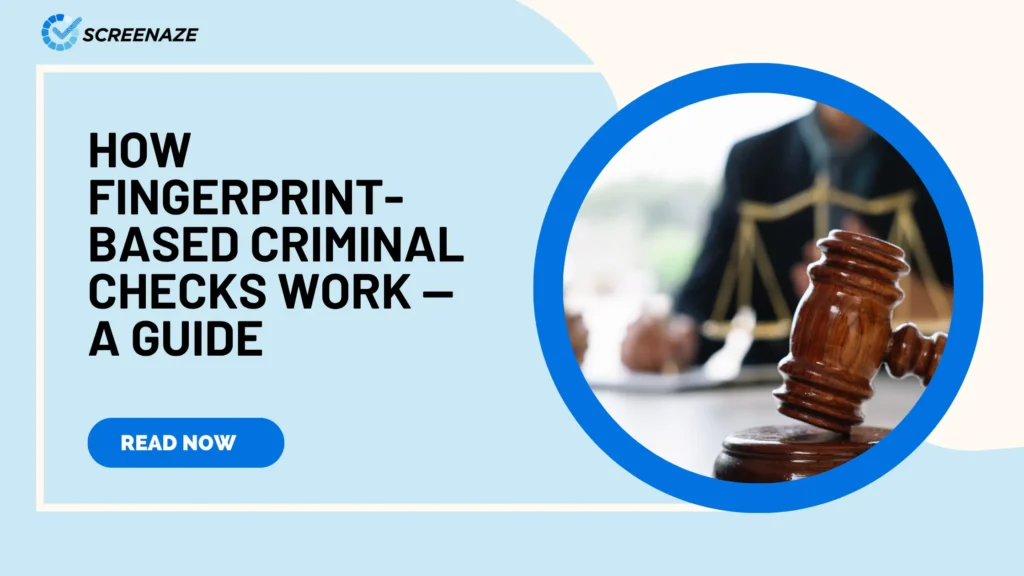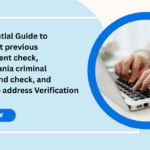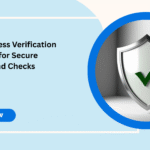In the world of identity verification, the fingerprint is the undisputed gold standard. While names can be changed, misspelled, or intentionally falsified, a fingerprint is an unalterable, unique biological identifier. For employers seeking the highest level of assurance in their hiring process, a fingerprint-based criminal check offers a degree of certainty that no other method can match. It moves beyond searching for a name in a database to asking a more definitive question: “Has this specific person ever been entered into the national criminal database?”
But how does this process actually work in India? It’s not as simple as a quick online search. It involves advanced biometric technology, secure government databases, and a systematic procedure designed for accuracy and security. This guide will demystify the fingerprint-based criminal background check, explaining the science, the step-by-step process, and its practical application in the Indian employment landscape. Understanding this process is key to building a truly robust and risk-averse hiring strategy with a trusted partner like Screenaze.
Table of Contents
The Science of Uniqueness: Why Fingerprints are the Ultimate ID
Before diving into the process, it’s essential to understand why fingerprints are so reliable. Every person’s fingerprints contain a unique pattern of ridges and valleys. Within these patterns are specific points, known as “minutiae,” such as ridge endings, bifurcations (where a ridge splits in two), and dots.
The exact number, type, and location of these minutiae points are unique to each individual. No two people in the world—not even identical twins—share the same fingerprints. It is this biological principle that makes fingerprint identification the most reliable method for a criminal record check, as it creates an irrefutable link between a physical person and their documented history.

The Core of the System: NAFIS and the Process of a Fingerprint Criminal Check in India
In India, the backbone of all fingerprint-based criminal verification is the National Automated Fingerprint Identification System (NAFIS). Managed by the National Crime Records Bureau (NCRB), NAFIS is a centralized, searchable database containing the fingerprint records of over a crore (10 million) arrested and convicted individuals from across the country. When a fingerprint check is conducted for employment or verification purposes, this is the primary database being queried.
Here is a step-by-step breakdown of how the process works:
Step 1: Secure Collection of Fingerprints
The first step is to capture a clear, high-quality set of the candidate’s fingerprints. This is typically done in one of two ways:
- Live Scan: This is the modern, digital method. The candidate places their fingers on a digital scanner, which captures high-resolution images of the prints. This is the standard method used at Passport Seva Kendras (PSKs) and other government facilities.
- Ink-and-Roll Method: The traditional method involves applying ink to the fingertips and rolling them onto a standardized fingerprint card (like the FD-258 card). While older, this method is still used in some contexts and, if done by a trained professional, is highly effective.
Crucially, this step must be preceded by obtaining explicit, written consent from the individual, as biometric data is highly sensitive and protected under Indian law.
Step 2: Submission to the Appropriate Authority
Once captured, the fingerprints are not sent to a private company for searching. They are securely submitted to the relevant government or law enforcement authority. For example, when applying for a Police Clearance Certificate (PCC), the application and fingerprints are processed through the regional passport office and forwarded to the police for verification.
Step 3: The Search via Automated Fingerprint Identification System (AFIS)
This is where technology takes over. The submitted fingerprint images are processed by criminal background check software known as AFIS. The system doesn’t compare the full images, which would be slow and inefficient. Instead, it:
- Extracts Minutiae: The software analyzes the fingerprint and extracts its unique minutiae points.
- Creates a Template: It converts these points into a secure, mathematical representation known as a biometric template.
- Searches the Database: This template is then compared against the millions of templates stored in the NAFIS database at incredible speed.
Step 4: Analysis and Results
The search yields one of two outcomes:
- No Match Found (“No Hit”): If the system finds no match for the candidate’s fingerprint template in the criminal database, it indicates the individual does not have a criminal record on file. A clearance certificate or report is then issued.
- A Match is Found (“Hit”): If the system finds a potential match, the process is not yet complete. The potential match is flagged and must be verified by a trained and certified fingerprint expert. This human verification step is critical to confirm the match is accurate before any adverse information is reported.
This rigorous, technology-backed process is what makes a fingerprint criminal check the most definitive verification method available.
Fingerprint vs. Name-Based Criminal Checks: Understanding the Difference
For most pre-employment screening, a name-based criminal history check in India is the standard. It is a vital and effective tool. However, it’s important to understand its limitations compared to a biometric check.
- Name-Based Checks: These searches query court records and police databases using a candidate’s name, father’s name, address, etc. They are fast and comprehensive. However, they can be complicated by:
- Common Names: A person named ‘Rajesh Kumar’ might be confused with others who share the name.
- Aliases and Name Changes: Individuals may use different names to hide their past.
- Typos and Errors: Simple spelling mistakes in records can lead to missed information.
- Fingerprint-Based Checks: This method bypasses all the ambiguities of a name. It is tied directly to the person. There are no aliases or common names to worry about. If a person’s prints are in the criminal database, they will be found, regardless of the name they are currently using. This provides an unparalleled level of certainty for a criminal record check in India.
Practical Uses: When is a Fingerprint Check Required?
While it is the gold standard, a fingerprint check is not standard for every job in the private sector. It is typically required in specific, high-security situations:
- Police Clearance Certificate (PCC): This is the most common reason for a fingerprint check. A PCC is mandatory for individuals seeking long-term visas, immigration, or permanent residency in foreign countries.
- Government Employment: Many central and state government jobs, especially in sensitive departments, require a thorough police verification that includes a fingerprint check.
- High-Security Private Sector Roles: Jobs in sectors like banking, finance, education (especially working with children), and private security may require a more stringent criminal check, sometimes involving fingerprints, to ensure the highest level of safety and integrity.
For most other roles, a comprehensive name-based check conducted by a professional firm like Screenaze, which scans court records and police databases, is both sufficient and the industry best practice.
How Screenaze Fits In: Your Expert Screening Partner
While Screenaze is not a government agency that runs the NAFIS database, our role as a leading background verification provider is to be your strategic partner in this process. We help you build a screening program that is both compliant and perfectly tailored to your needs.

- Policy Guidance: We help you determine the appropriate level of screening for each role. We’ll advise you on when a comprehensive name-based criminal check is sufficient and when a more rigorous process, such as guiding a candidate to obtain a PCC, might be necessary.
- Streamlined Process: Our advanced platform can manage the entire workflow. Even if a fingerprint check is required, we can integrate the results and guide the candidate through the necessary steps, ensuring you have a complete and consolidated report.
- Comprehensive Solutions: Our core criminal check services provide deep insights by searching millions of court and police records. This is the foundation of any strong screening policy and often provides all the information you need to make a confident hiring decision.
In conclusion, the fingerprint-based criminal check represents the pinnacle of accuracy in background screening. While not required for every hire, understanding how it works is crucial for any employer dedicated to creating a safe and secure workplace.
Frequently Asked Questions (FAQs) on Safe Background Screening
-
What is the single biggest and most common mistake to avoid when conducting a criminal background check?
The most critical mistake to avoid is failing to obtain clear, explicit, and written consent from the candidate before initiating any part of the background check. This is the golden rule of compliant and ethical screening.
-
Why is skipping candidate consent such a serious mistake?
Skipping consent is a major legal and ethical breach. It violates an individual’s fundamental right to privacy and can expose your company to significant legal action, fines, and reputational damage. It immediately breaks any trust with a potential employee.
-
Are free online background check websites safe to use for employment screening?
No, using free, public-facing websites for official employment screening is a serious mistake. The information on these sites is often inaccurate, incomplete, or outdated. Furthermore, these searches are not compliant with the legal standards required for making hiring decisions and can lead to unfair or discriminatory outcomes based on faulty data.
-
Is it a mistake to run background checks on only certain “suspicious” applicants for a role?
Yes, this is a major mistake that can lead to discrimination claims. A core principle of safe screening is consistency. You must have a standardized background check policy for each specific job role and apply it uniformly to every candidate who reaches that stage in the hiring process.
-
What technology is used to find a match in the database?
The system uses an Automated Fingerprint Identification System (AFIS). This technology doesn’t compare the whole fingerprint image. Instead, it digitally maps the unique points on your fingerprint (called minutiae) to create a secure mathematical template. This template is then rapidly compared against millions of records in the NAFIS database to find a match.





